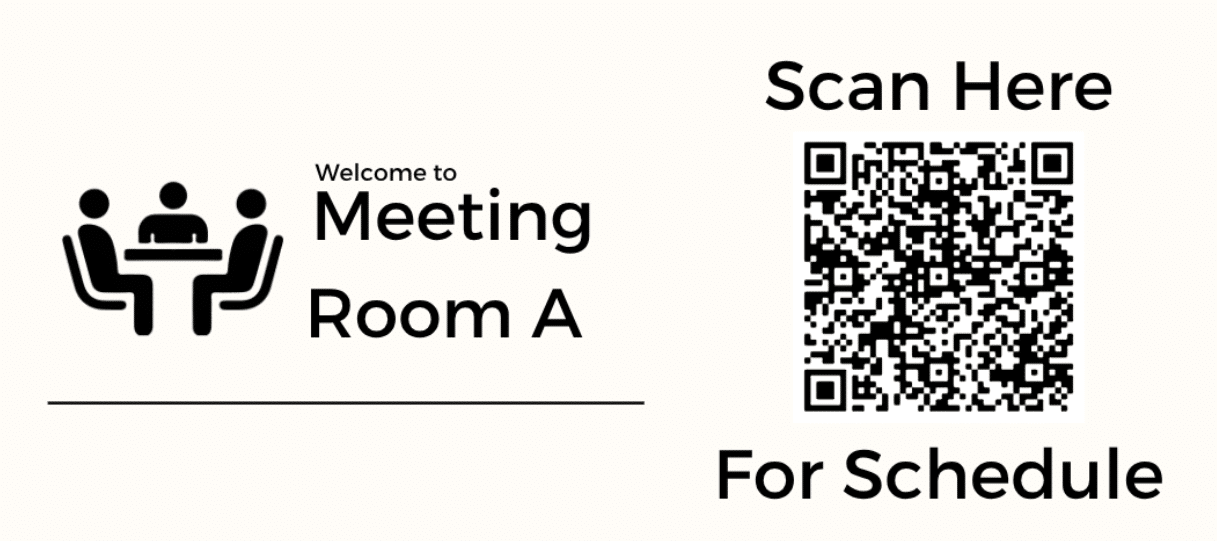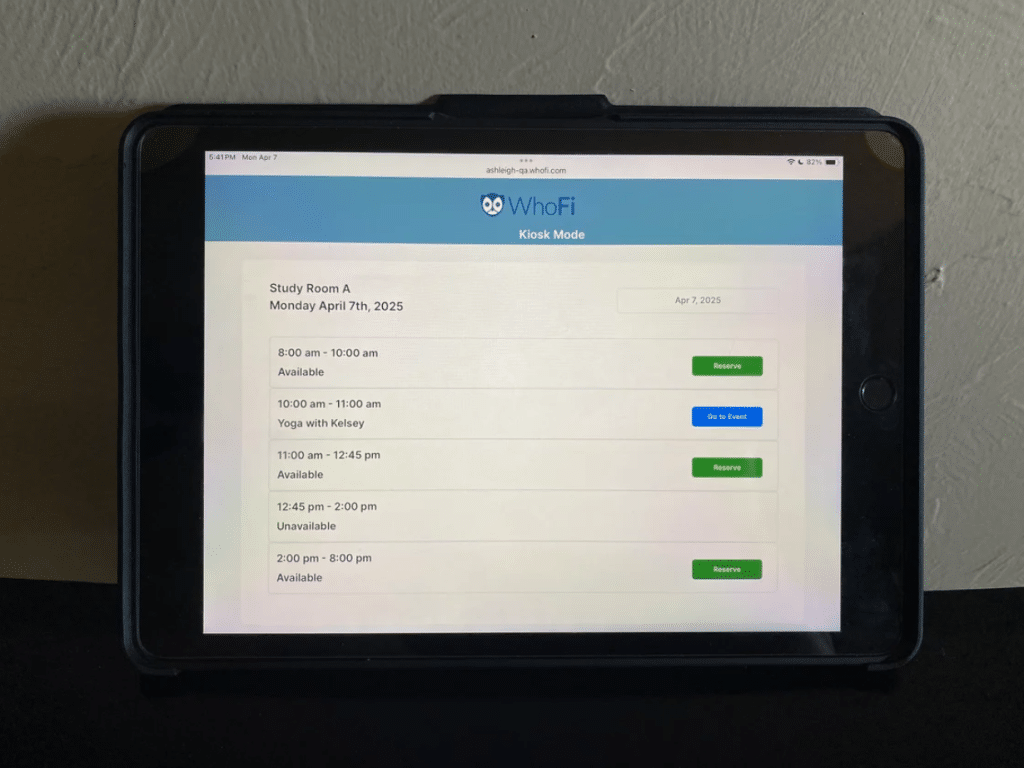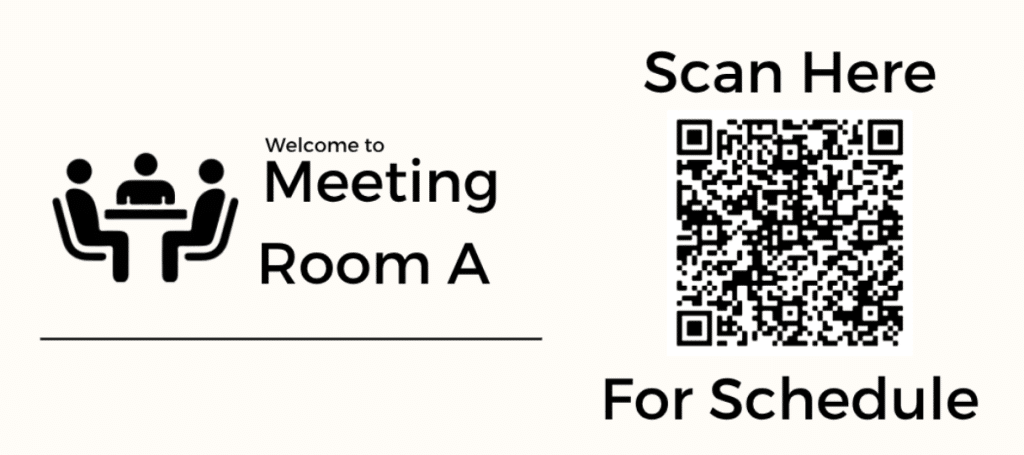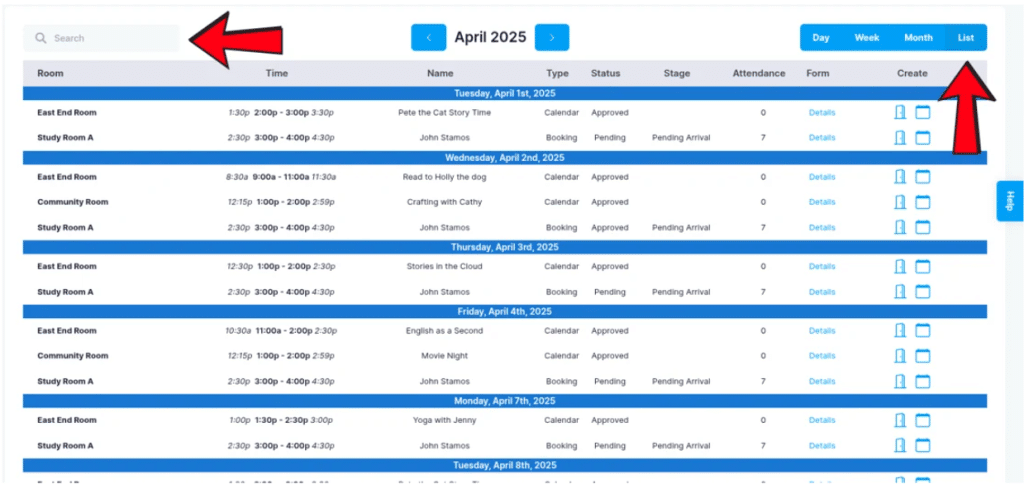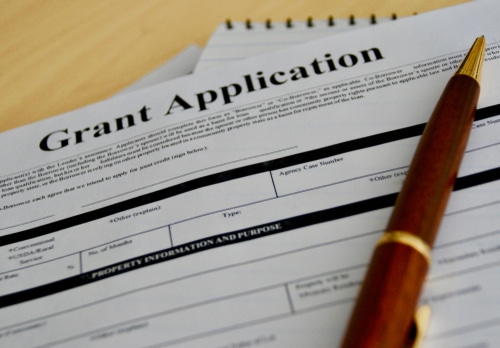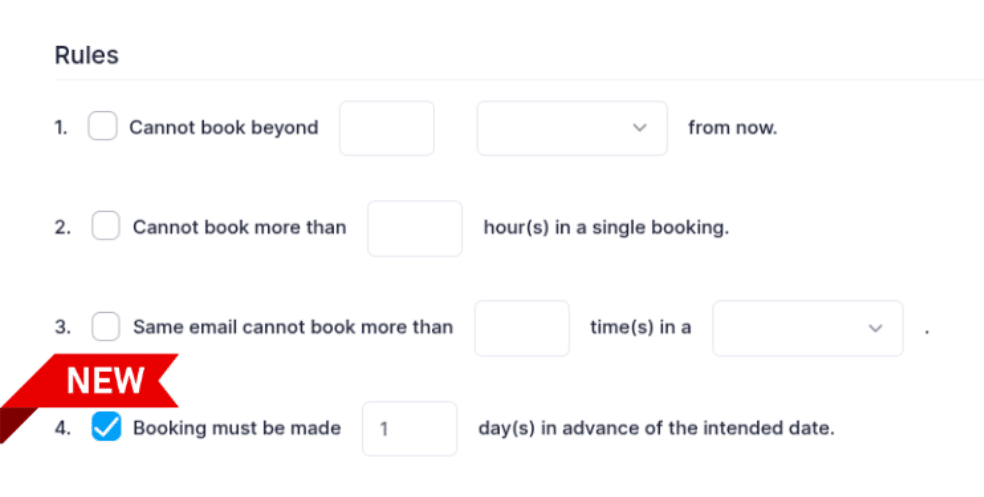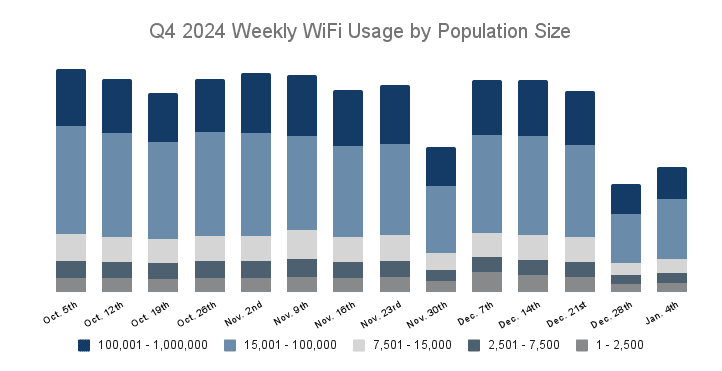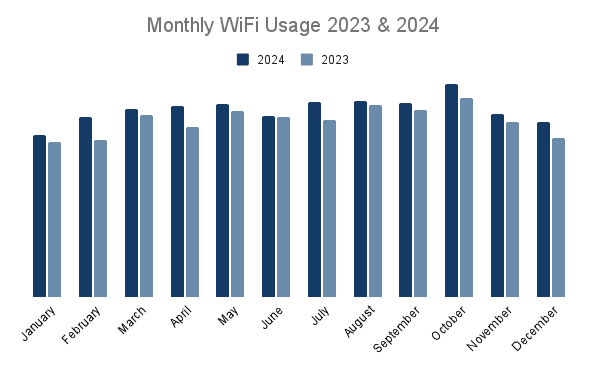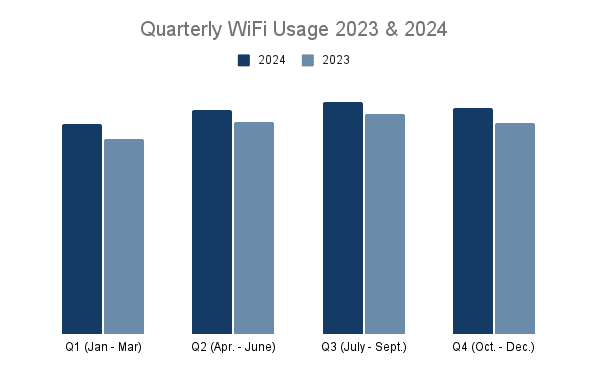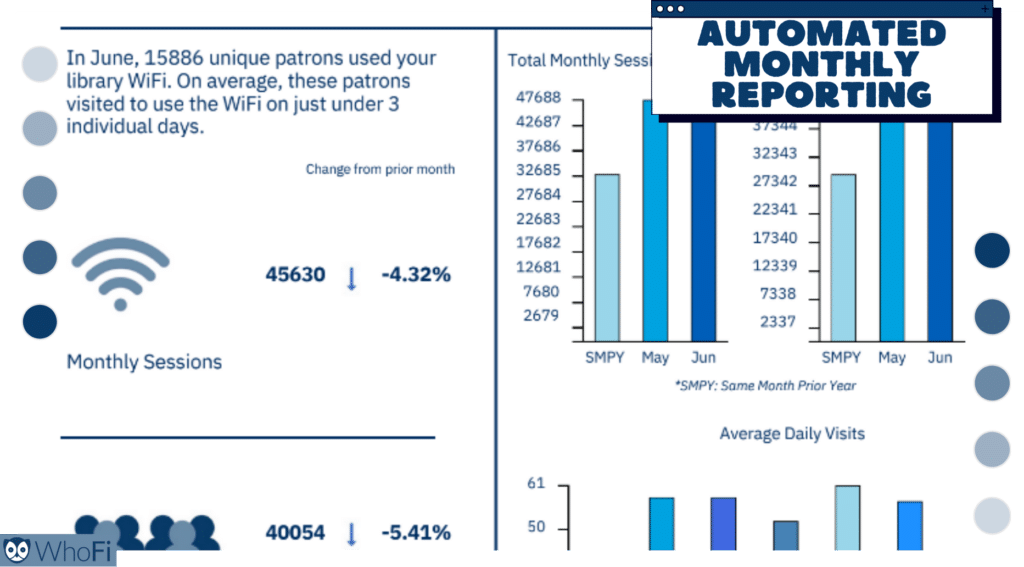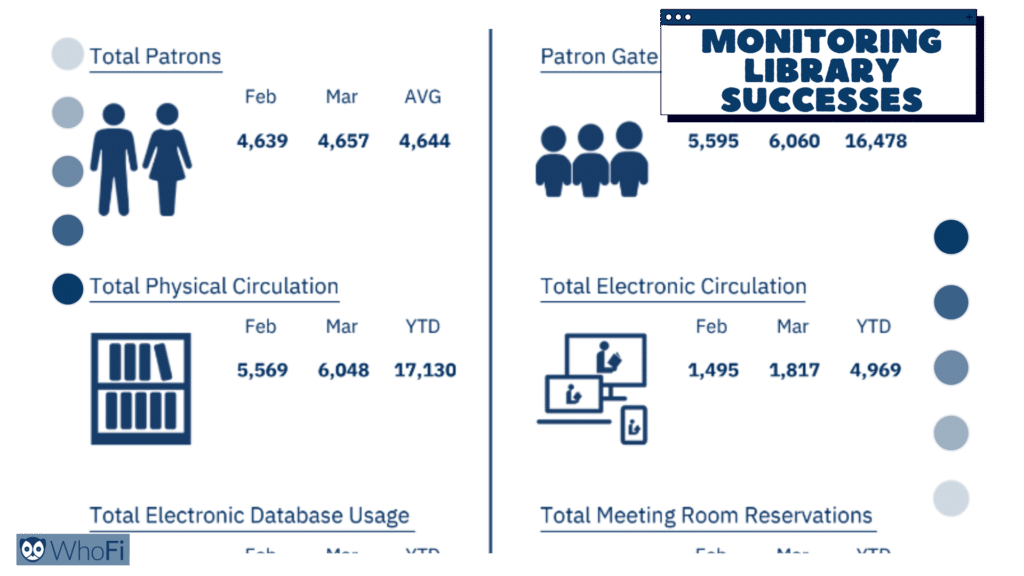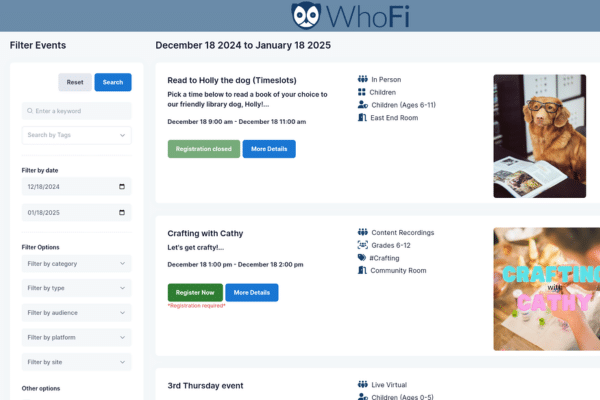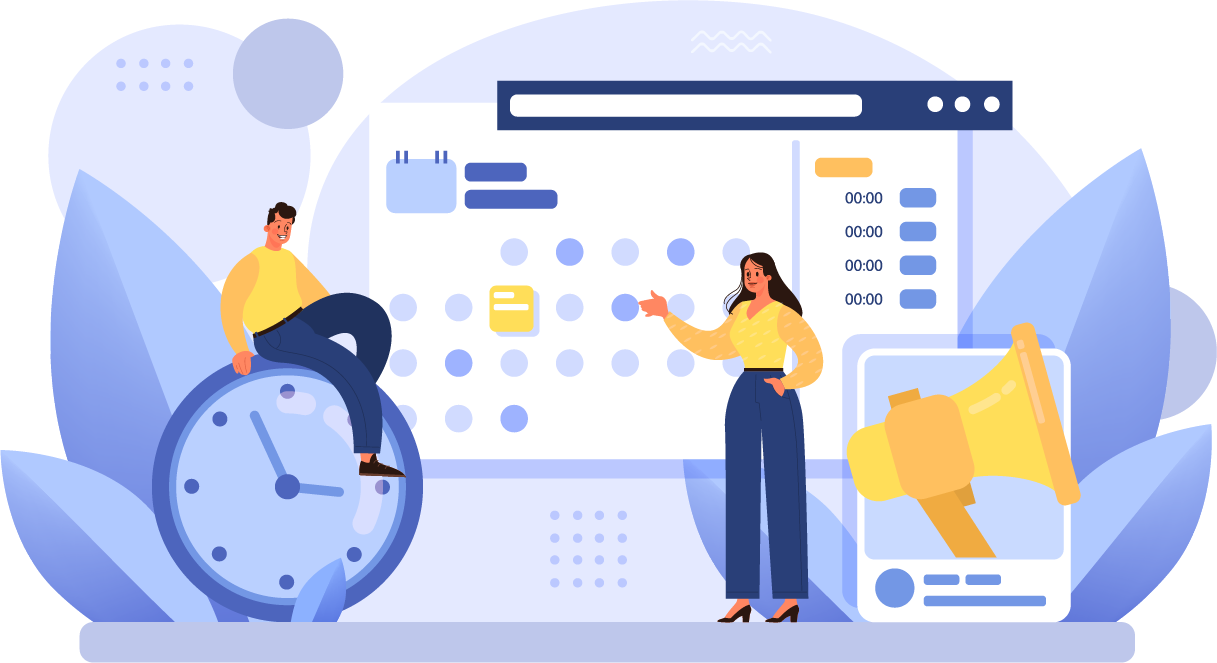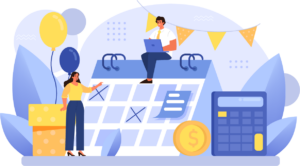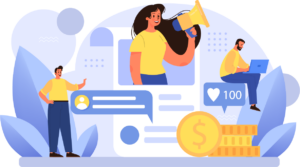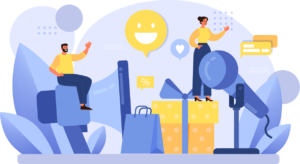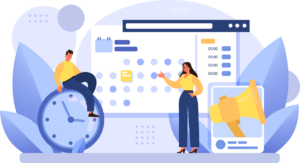6 New Ways WhoFi is Making Library Room Reservations Easier
Day‑to‑day feedback from librarians and staff using WhoFi in the field drives everything we build. These six enhancements grew directly out of that partnership, giving libraries—and any hybrid community space—smarter tools for managing room reservations, resources, and patron demand. Check out our library room reservations improvements below, or watch the video here.
-
Kiosk Mode for Rooms
Give patrons an instant snapshot of room availability the moment they walk through your doors. Kiosk Mode lets staff display a live schedule on any tablet or monitor and even allows on‑the‑spot bookings when a space is free.
-
Kiosk Mode via QR Code
No spare screens? Print a flyer with a unique QR code instead. Patrons simply scan, view the real‑time schedule on their phones, and reserve an open room in seconds.
-
New Booking Schedules: Week & List Views
Whether you’re planning next week’s events or need a quick, scrollable list of upcoming reservations, two new calendar views make it easier to spot open time slots and create bookings in a single click.
-
Export Bookings to CSV
Need a custom report for a board meeting or community grant? Download filtered booking data—complete with notes and form responses—straight to CSV for quick analysis and printing.
-
Prevent Same‑Day Bookings
Set how many days in advance you would like patrons to be able to reserve rooms (e.g., 24 hours) so staff have time to prepare rooms and resources. It’s a simple safeguard against last‑minute surprises.
-
Tagging Meeting Rooms
Group spaces with tags like Study Rooms, Makerspace, or Outdoor. Staff can filter by tag today, and patrons will soon be able to do the same on public booking pages—making the right space even easier to find.
These updates were added to keep libraries thriving as patron needs surrounding library room reservations evolve. Ready to see them in action? Visit whofi.com/demo to schedule a meeting and live walkthrough.
BOOK A DEMO
5 Tips for Creating a Thriving Community Hub
Community hubs such as libraries, museums, parks, and community centers provide invaluable services to local populations. Whether offering educational resources, public programs, or safe gathering spaces, these hubs serve as vital lifelines for social connection, learning, and enrichment. To sustain and grow a thriving community hub, leaders can focus on four critical areas identified in the Thriving Community Space Framework: Events, People, Data, and Resources.
Here are five tips to ensure that your community hub remains a vibrant and inclusive space where people feel connected and empowered.
1. Engage Your Community Hub Through Events and Advocacy
Events are a powerful way to introduce new people to your space and engage existing community members. Well-planned programs and advocacy efforts help raise awareness about the services your hub offers while giving community members a reason to return and stay connected.
- Why It Matters: Events not only attract new visitors but also allow existing members to bring others into the fold. According to research on civic engagement, consistent, relevant programming helps strengthen ties between institutions and their communities (National Civic League).
- Action Tip: Design events that appeal to various demographics within your community. Use both digital and in-person outreach methods to promote your events and encourage attendees to invite friends or family.
2. Empower People to Take Ownership and Lead
A community hub thrives because of the people who bring it to life. Engaged volunteers, organizers, and leaders create a sense of ownership that fuels the longevity of the space. Empowering members to lead programs or volunteer not only lightens the workload but also strengthens the community by fostering belonging and leadership.
- Why It Matters: Volunteerism and participatory leadership cultivate a deeper commitment to a space, encouraging long-term sustainability. Studies show that empowered volunteers feel more connected to the mission and are more likely to advocate for the hub (Points of Light).
- Action Tip: Reduce burdens for staff and train potential leaders within your space. Offer opportunities for volunteers to contribute their skills—whether by leading events, organizing workshops, or participating in advisory boards.
3. Use Data to Guide Decision-Making and Secure Funding
Data provides insights that help community hubs make informed decisions, allocate resources effectively, and advocate for ongoing support. Whether tracking attendance, assessing the success of programs, or gathering feedback, data ensures that your space remains relevant and responsive to community needs.
- Why It Matters: Data-driven decision-making is essential for ensuring that nonprofit organizations meet their goals and secure future funding. Demonstrating impact through data also strengthens relationships with funders and stakeholders (Urban Institute).
- Action Tip: Use platforms like WhoFi to collect and analyze data on attendance, program outcomes, and user satisfaction. Regularly review this information to adjust programming and present findings to boards or funders.
4. Optimize and Promote Your Available Resources
Resources are the foundation of any community hub. Whether offering a library’s book collection, a park’s open space, or a maker space’s 3D printers, ensuring that these resources are accessible and well-maintained is key to keeping the community engaged.
- Why It Matters: Accessible and well-utilized resources provide direct value to the community, reinforcing the importance of the hub. When community members recognize the tangible benefits of the space, they are more likely to support and advocate for its continued operation (IMLS).
- Action Tip: Regularly assess your available resources and promote them through signage, outreach, and online platforms. Create or utilize a system that tracks resource usage to ensure equitable access and inform decisions about future investments.
5. Share Knowledge and Best Practices Through Platforms Like Community Connectors
Community hubs do not thrive in isolation—learning from other community leaders helps strengthen your space and ensures long-term sustainability. Platforms like Community Connectors enable space managers to share ideas, discover best practices, and connect with others who are equally passionate about empowering local communities.
- Why It Matters: Collaborative knowledge-sharing amplifies the impact of community hubs by enabling leaders to replicate successful models and innovate within their own spaces (Mainstream Nonprofit Solutions).
- Action Tip: Join Community Connectors to engage with a network of leaders who are actively improving and advocating for hybrid community spaces. Share your experiences and learn from others to ensure that your hub remains a catalyst for positive change
By focusing on these four key areas—Events, People, Data, and Resources—community hubs can become more than just physical spaces. They transform into vibrant, inclusive environments that serve as pillars of connection, learning, and opportunity. Through platforms like Community Connectors, community leaders can exchange ideas and inspire one another to build stronger, more resilient hubs that serve their communities for years to come.
JOIN THE COMMUNITY
https://youtu.be/Wydhp6UzSMs
How to Streamline Library Annual Report Completion
Libraries play a crucial role in their communities, but behind the scenes, staff members face a significant challenge: collecting and reporting service usage efficiently. Many libraries have struggled with outdated methods, such as spreadsheets and paper form tabulations, that take up valuable time and energy. However, with the implementation of WhoFi’s Question Sets, libraries are transforming the way they collect and utilize information to make informed decisions and complete the library annual report.
The Challenge: Time-Consuming Data Collection
Before using Question Sets, libraries relied on complex, time-consuming methods to track things like program attendance, service desk requests, and study room usage. Many reported spending countless hours manually compiling information, which left little to no time for analyzing trends and planning for the future.
"Gone are the days of keeping Excel spreadsheets." – Jonatha
"Each month, gathering my data took hours, multiple emails, and several spreadsheets to get the information into a usable format." – Susan
"Before QS, I had staff put their data into a spreadsheet, then I would take that data and put it into a Word document just to make it easier to read. Now, with WhoFi, I get clear reports in just a few minutes." – Annette
Libraries needed a solution that could save them time and make data more accessible for future planning.
The Solution: Simplified State Reporting
One of the biggest advantages of Question Sets is its ability to simplify library annual report submissions. Instead of scrambling to compile data at the last minute, libraries can input information throughout the year, ensuring a smoother and more efficient reporting process.
"Question Sets helps tremendously when it’s time to do the survey. It has been extremely helpful!" – Alison & Jonatha
"No more spending hours, days, and weeks putting the information together." – Amie
With Question Sets, libraries can complete their annual reports in a fraction of the time, eliminating stress and ensuring accuracy.
The Impact: More Time for What Matters
Libraries that have adopted Question Sets report significant time savings, allowing staff to focus on more impactful work—engaging with their communities and enhancing library services.
"Before QS, it took me a full 40-hour work week to complete the survey; now it takes just a day!" – Lisa
"It cuts my reporting time in half." – Sabrina
"I no longer have to lock myself up in my office for the last week in October. The collaboration that QS invites staff into helps everyone contribute to the survey." – Allie
By reducing the administrative burden, libraries can allocate more resources to community engagement and strategic planning.
Through the feedback of library partners, it’s clear that Question Sets is making a tangible difference. It eliminates cumbersome manual library reporting processes, streamlines state reporting, and ultimately frees up staff time for what truly matters—serving their communities.
If your library is still struggling with manual data collection, consider making the switch to a more efficient and effective solution. WhoFi’s Question Sets might just be the game-changer your library needs. Contact us to learn more at marketing@whofi.com or click the demo button below.
BOOK A DEMO
Transforming Library Data Management with WhoFi: Time-Saving, Insightful, and Impactful
Libraries play a crucial role in their communities, providing valuable resources, services, and programming. However, the administrative side—library data management, compiling reports, and justifying funding—can be overwhelming. That’s where WhoFi comes in, revolutionizing how libraries collect, manage, and present their data.
From small rural libraries to large urban institutions, WhoFi’s Question Sets is transforming the way staff manage statistics. It is saving hours of manual work while providing accurate and actionable insights. Here’s how libraries across the country are benefiting from WhoFi.
Simplifying Data Collection & Reporting
Many libraries previously relied on Excel spreadsheets, manual logs, and paper records to track attendance, reference questions, and computer usage. This made annual state surveys and board reports time-consuming and prone to inaccuracies.
With WhoFi’s centralized data tracking, libraries can:
🤷 Eliminate guesswork and manual tracking – No more averaging numbers or hunting down lost spreadsheets.
🖥️ Easily input data in real-time – Staff can enter visitor counts, reference questions, computer checkouts, and program attendance in one place.
✅ Auto-populate state annual reports – Libraries using WhoFi’s Question Sets have seen reporting time cut in half, with data ready to be transferred into state surveys.
🏢 Quickly generate board and city council reports – A few clicks provide clear, easy-to-read reports, reducing prep time from hours to minutes.
"Prior to WhoFi, we were using Excel, which worked but was difficult to manage each year. Now, we log in and enter our data, knowing it’s safely stored and instantly accessible for reports." - Jonatha Basye, Van Meter Public Library & Brittany Wallace, New Albin Public Library
Empowering Staff & Enhancing Collaboration
WhoFi isn’t just about automation—it’s about creating a more collaborative data culture within libraries. Instead of one person compiling all the statistics, data entry can be decentralized, allowing multiple staff members to input real-time stats without the need for constant oversight.
🤲 Staff collaboration – Everyone can contribute to data tracking, leading to a more accurate representation of library activities.
🧠 Better decision-making – Library data management comes easy, track event attendance, and adjust programming as needed.
🆕 Easier onboarding for new directors – No more deciphering past directors’ notes or digging through multiple files—all data is in one place.
"The annual survey is no longer something I lock myself in my office for the last week of October to complete. Now, it's a team effort!" - Allie Paarsmith, West Liberty Public Library
Driving Better Library Decisions with Data
Libraries using WhoFi have been able to spot trends, justify funding requests, and make data-backed programming decisions.
📊 Track program success & adjust offerings – Seeing lower attendance for adult programs? Try different nights or add Saturday sessions.
📈 Compare year-over-year data – Libraries can now easily compare December attendance to the previous year to measure growth.
💰 Advocate for funding – When applying for grants or requesting budget increases, concrete stats demonstrate impact and need.
"WhoFi’s data helped us secure a $5,000 grant for outdoor space improvements and stronger WiFi. The reports provided the evidence we needed to justify the funding request." - Orange City Public Library, Lisa Johnson
Eliminating the Hassle of Annual Reports
For many libraries, state annual surveys used to take weeks of library data management. WhoFi has turned this once-dreaded task into a streamlined process, with reports that are automatically formatted for state submissions.
⏳ Significant time savings – Librarians noted reporting times cut in half, allowing them to focus on community engagement instead of paperwork.
💡 Accurate statistics for advocacy – WhoFi’s reports help directors confidently present their library’s value to boards, city councils, and stakeholders.
"I was able to finish our report soon after it was open to start. No more spending hours, days, and weeks putting the information together. " - Amie Herrick, Mellinger Memorial Library
Making Library Data Work for You
WhoFi is more than just a reporting tool—it’s a game-changer for libraries looking to optimize operations, better serve their communities, and save time on administrative tasks.
🎯 Easier, more accurate data tracking
⏳ Time-saving automation for reports
ℹ️ Informed decision-making with real-time insights
💰 Stronger advocacy for funding and community support
Libraries across the country are transitioning from outdated tracking methods to a more streamlined, data-influenced approach—and WhoFi is leading the way.
🚀 Want to see how WhoFi can help utilize the data you collect for decision making and advocacy? Contact us today for a demo and discover how you can take express library impact. Reach us at marketing@whofi.com or at whofi.com/demo.
https://youtu.be/Xf9_KbWwReU?si=Gg6q6zZFRL11Hwe2
Annual Analysis of Public Library WiFi Usage 2024
Libraries have always been centers of knowledge and community, but in recent years, patrons have engaged with these vital spaces in ever-more exciting ways. As we reflect on library usage trends in 2024, we celebrate the myriad ways libraries support their communities helped by WhoFi—not only through WiFi Analytics but also with tools like Community Calendar (for program planning, promotion, and registration), Meeting Rooms (for streamlined space management), and Question Sets (for centralizing data and storytelling). Now, in 2025, we look back on the data from the previous year to understand how libraries adapted, innovated, and thrived—building on the momentum from 2024.
Fourth Quarter 2024 Usage on a Weekly Basis
In Q4 of 2024, libraries experienced slightly higher weekly WiFi usage compared to the same period the previous year (2023), even with the typical decreases around Thanksgiving, Christmas, and New Year’s. This underscores patrons’ continued reliance on library-provided internet access for holiday travel planning, online shopping, virtual learning, and staying connected with friends and family.
From study groups and community workshops to festive celebrations the numbers are clear that libraries remained in demand—even amid holiday slowdowns. Looking back into previous quarters it becomes clear that libraries are consistently relied on for internet all year round.
Year in Review: High October Library Usage Trend
A standout observation from 2024 is that October was once again the busiest month for WiFi usage, marking two years in a row (2023 and 2024) where October outpaced every other month. Librarians may point to the combination of back-to-school activities, fall-themed programs, and heightened community engagement events—spanning everything from homework help sessions to Halloween festivities.
The festive draw of October programming combined with the fundamental need for consistent internet access remains central to why so many patrons visit the library. From students working on projects to community members seeking reliable connections for things like job applications, October’s consistent surge in activity underscores the library’s vital role as a technology resource hub.
Quarterly Overview: Q3 Continues to Lead
Despite October’s impressive numbers, a look at 2024’s quarterly totals confirms Q3 remains the busiest quarter overall. This repeats a pattern seen in 2023, likely reflecting the surge in back-to-school preparations (both academic and extracurricular) and robust summer programming that naturally extends into early fall. Meanwhile, end-of-year holiday schedules and traveling can reduce library visits in Q4, though many libraries effectively mitigate this lull by maintaining a steady calendar of community events and services.
In 2024, select libraries were introduced to version 1.0 of WhoFi’s Question Sets, a collaborative effort initiated by State Libraries, public libraries and WhoFi to streamline data collection, organization, visualization and reporting. Some of the goals included supporting data-influenced decision making, advocacy efforts, and to ease the burden of board and annual survey reporting., This marks a significant milestone in all-in-one library service management. By integrating Question Sets with existing WhoFi solutions—such as WiFi Analytics, Community Calendar, and Meeting Rooms— library staff can consolidate all of their data within a single dashboard, simplifying workflows and enhancing both daily operations and long-term planning.
Interpreting Library Usage Trends for 2025
As we look back on 2024 and move forward into 2025, libraries continue to evolve in remarkable ways—adopting new technologies, refining community engagement, and standing firm in their commitment to equitable access. Through WhoFi’s easy to integrate tools—WiFi Analytics, Community Calendar, Meeting Rooms, and Question Sets—libraries can better serve their patrons, promote programs, gather actionable insights, and use data to make decisions that will allow them to thrive for generations to come.
This year’s data reaffirms that libraries are indispensable—not just as providers of internet connectivity but as hubs of community, learning, and opportunity. By staying in tune with patron needs, embracing innovative approaches, and providing welcoming spaces, libraries have consistently proven their resilience and relevance. WhoFi remains committed to supporting library staff, empowering them to make data-influenced decisions that foster stronger connections and more impactful services. As we look ahead to 2025, there’s every reason to be optimistic that libraries will continue to thrive—enriching lives and strengthening community bonds well into the future.
As libraries continue to evolve and thrive in 2025, WhoFi stands ready to support their success. Our mission is to empower library teams with the tools and insights needed to enhance community engagement, streamline operations, and deliver the services patrons rely on. If you’d like to discover how WhoFi can help your library, we invite you to reach out to us at marketing@whofi.com or visit whofi.com/demo to schedule a meeting. Let’s work together to ensure library usage trends remain vibrant, connected, and indispensable community hubs for years to come!
How WhoFi is Helping Librarians Thrive in 2025
Libraries face a growing challenge: balancing their role as essential community hubs with the increasing demand for clear reporting and decision making based on insights. Whether it’s preparing annual reports, communicating with stakeholders, or organizing programs, the administrative workload can be overwhelming. Many librarians would rather spend this time for planning and patrons...
Fortunately, there’s a solution. Some libraries have found a way to simplify reporting, enhance their communication with stakeholders, and better connect with their communities. In this post, we highlight insights from librarians who have embraced WhoFi’s tools to overcome common challenges and unlock new opportunities this year. Read more about how we're helping librarians thrive in 2025 below!
Simplifying Reporting and Saving Time
Thanks to Question Sets and automatic monthly reports librarians no longer spend hours at the end of the month and year manually compiling data, allowing them to focus on what truly matters—benefiting their communities.
Tierra Griffith from Montrose Memorial Library shares, “The counts that are automatically added to the annual report are the best. [WhoFi] also helps me prepare for board meetings."
Before implementing Question Sets, many libraries relied on manual data entry and paper logs. With WhoFi, essential metrics like program attendance, WiFi session counts, and circulation data are stored in a central database and easily accessible for reporting. This shift has reduced workload and stress, enabling librarians to use the insights within for planning.
Enhancing Stakeholder Communication
Clear and engaging communication with stakeholders is vital for libraries who rely on ongoing support from towns, cities, and other groups to operate. WhoFi’s reporting tools empower libraries to present their value in impactful ways.
Wendy Doyle of Woodbine Carnegie Library notes, “Thanks to the easy-to-understand information in Question Sets reports, we are actually being noticed by the city council and asked questions.”
Visual reports make it easier for libraries to demonstrate their impact to city councils, boards, and other stakeholders. This increased visibility creates opportunities for libraries to connect with local leaders or even secure additional funding for new initiatives.
Supporting Community Connections
Libraries play a pivotal role in their communities, offering programs and services that meet diverse needs. WhoFi is helping librarians track and showcase these efforts, strengthening their connection to the people they serve.
Laurie Hazel from Cambridge Memorial Library highlights, “We are making a difference here with all of our programs and participants. People are using our library for lots of things, not just books.”
By providing insights into patron trends and service usage, WhoFi enables libraries to tailor their offerings to better serve their communities. These insights also foster collaboration with local organizations that may want to be involved, further expanding the library’s reach and impact.
Learning and Growing Together
The journey to develop new tools for libraries is a collaborative effort. We rely on libraries to guide our development efforts and make the service even better.
Sabrina Lewis of Avoca Public Library shares, “I tell people I am sure [WhoFi] will continue to get better as time goes on.”
Listening to library feedback and implementing changes has been instrumental in creating an all-in-one solution for libraries. By fostering a community of learning and innovation, WhoFi is helping librarians thrive and adapt in an ever-changing landscape.
By simplifying administrative tasks, enhancing communication, and deepening community connections libraries using the suite of services can continue to demonstrate their worth, advocate for their needs, and enrich the lives of those they serve.
As Sabrina Lewis wisely said, “If you do things the same way, it can be hard to change, but it is worth giving it a chance.” Explore how WhoFi can transform your library’s operations and impact today, click the button below to schedule a meeting!
BOOK A DEMO
Add Search Optimization to your Library Marketing Strategies
Imagine a local patron searching for events this weekend and discovering your library’s program at the top of their search results! With WhoFi’s new update, all events created in the Community Calendar are now optimized to appear in search engines like Google. This feature bridges the gap between library marketing strategies and their communities, ensuring that your programs are visible and accessible to more local patrons than ever.
Why SEO Matters for Libraries
Search Engine Optimization (SEO) is how search engines like Google know your content exists and decide to show it to the right people. For libraries, local SEO is a great way to bring patrons in for programs and events. A strong online presence ensures your events can show up alongside other local events and resources.
How the New Feature Works
All programs created in WhoFi’s Community Calendar have a unique page that is now automatically optimized to appear in local search results. Events are tagged with essential metadata like location, date, description, and title, making them more likely to appear in local searches.
For example, someone searching for “storytime near me” could see your library’s event listed alongside other local happenings, directing them to your Community Calendar for more details and registration.
Best Practices for SEO-Optimized Library Events
To maximize the visibility of your library’s programs, follow these tips for creating SEO-friendly events:
- Craft Specific and Engaging Titles
- Good: “Fun Storytime Event!”
- Better: “Free Family Storytime – Ages 3-10 at the Main Library!”
- Use keywords patrons might search for, like "free," "family-friendly," or "crafting"
- Optimize Descriptions with Relevant Keywords
- Include clear, concise descriptions with terms like:
- "Hands-on STEM crafts for kids"
- "Local book club for mystery lovers"
- "Free community workshop on job searching"
- Think about what your patrons would type into Google.
- Include clear, concise descriptions with terms like:
- Use Images When Possible
- Add event images (book covers for book clubs, photos of past events) to WhoFi.
- Engaging visuals increase on page engagement and make events even more appealing to patrons.
These small adjustments make your events easier to find and more compelling to patrons.
Benefits for Libraries and Patrons
This new feature offers significant advantages for both libraries and their communities. For libraries, the ability to have their events appear in search engine results means greater visibility and attendance by reaching patrons who may not regularly follow the library’s website or social media channels. It also reinforces the library’s position as a central, accessible hub for local activities and programs, ensuring they remain a vital resource in the community.
For patrons, this feature makes discovering enriching, free local activities easier than ever. By integrating library programs directly into their natural search habits, patrons can seamlessly access events and find programs that align with their interests, whether they’re looking for family-friendly activities, educational workshops, or book club meetings.
WhoFi’s new SEO-boosting library marketing strategies for the Community Calendar makes it easier than ever for libraries to connect with their local patrons. By ensuring events appear in search engine results, your library becomes more visible, accessible, and relevant in your community.
Ready to get started? Start creating events with WhoFi today, and let your library shine in local search results! Contact us at marketing@whofi.com or click the button below to learn how.
5 Winter Library Program Ideas for 2025
As the chill of winter sets in, libraries are the perfect haven for warm community gatherings and engaging programs. This season, why not inspire your patrons with creative and heartwarming activities? Below, we’ve curated some fresh and fun library program ideas to spark your library’s winter lineup. These programs not only bring communities together but also highlight the library as a central hub for connection and learning.
Looking for new ways to make winter memorable? Check out these five inspiring ideas!
1. Cozy Winter Reading Challenge
Help your community stay engaged during the colder months with a Winter Reading Challenge for all ages. Encourage families to pick up books and read together during winter break. Share the program on your library’s social media and website to boost participation.
2. Winter Poetry Contest
Host a Winter Poetry Contest to bring out the creative side of your community. Invite students and adults to submit their favorite winter-inspired poems and let patrons vote for the winners. Small prizes, like gift cards donated by local coffee shops or items from the Dollar Store, can make the contest even more exciting! Inspired by ideas from Mackin Learning.
3. Hygge Program
Introduce your patrons to the cozy Danish concept of Hygge (pronounced “hyu-guh”) with a relaxing program designed to embrace comfort and togetherness. Set the ambiance with a virtual fireplace, soft music, blankets, and cozy chairs. Serve hot chocolate or tea and lay out coloring sheets, board games, and books about Hygge. To make it extra special, consider offering traditional Danish treats or inviting a therapy dog to cuddle with participants. Learn more about this idea at Programming Librarian.
4. DIY Hot Chocolate Bar
Everyone loves a steaming cup of hot chocolate during the winter! Set up a DIY Hot Chocolate Bar where patrons can customize their drinks with marshmallows, whipped cream, candy canes, and other toppings. Combine it with a book discussion or family movie night for an extra cozy experience.
5. Interactive Display Wall
Engage younger patrons with an Interactive Display Wall that allows them to contribute creatively to the library space. A great example is the “We Are Unique as Snowflakes” wall, where kids color cutout snowflakes, write their favorite thing about winter, and attach them to the display. By the end of the season, the wall will be covered with lots of unique creations! Get inspired by this idea from the Association of Library Service to Children (ALSC).
These winter library program ideas are sure to warm hearts and bring your community together this season. Which one will you try first?
Want to learn more about WhoFi and how we make it easier to plan, promote, gather registrations for, and report on programs? We want to hear from you about your current challenges! Click the button below to schedule a meeting. Happy Winter Programming!!
Free Trial for Public Libraries
https://youtu.be/ySxUrlJ0Uz0
How to Add Programs from Community Calendar to MailChimp Emails
Keeping your library patrons updated on upcoming events is easy with WhoFi’s Community Calendar and MailChimp integration. In this guide, we’ll walk you through two methods to add your events to MailChimp emails: manually adding content or using an RSS feed for automatic updates.
If you'd prefer to watch the full process, check out our video tutorial that covers both methods in detail at the bottom of this post.
Method 1: Manually Adding Events
This method gives you full control over the content and layout of your emails. Follow these steps:
- Log in to MailChimp and start creating a new email campaign.
- Add a text block for each event. In the block, type the event’s title, date, and description.
- Insert images by dragging an image block into your email and uploading your event’s image.
- Link to your events by highlighting the event title or image, clicking the link icon, and pasting the event’s URL from your WhoFi Community Calendar.
Tips for Manual Method:
- You can customize each event’s look and feel to match your library’s branding.
- Ensure you include all relevant details, like event descriptions and links to more information.
Method 2: RSS Feed Integration
For libraries looking to automate the process, you can integrate your Community Calendar with MailChimp using an RSS feed. This method will automatically pull and display the next 5 upcoming events from your calendar.
Here’s how to set it up:
- Email support@whofi.com to activate and receive your unique Community Calendar RSS URL.
- Log in to MailChimp and create a new email campaign.
- In the email editor, add a code block to your email.
- Paste the following code into the code block element in MailChimp.
- <div class="mcnTextContent">*|FEEDBLOCK:https://hl-library-qa.whofi.com/calendar/rss/|**|FEEDITEMS:[$count=5, $constrain_rss_img=Y]|*<p>*|FEEDITEM:TITLE|* - *|FEEDITEM:DATE|*</p><p>*|FEEDITEM:IMAGE|*</p><p>*|FEEDITEM:CONTENT|*</p><p><a href="*|FEEDITEM:URL|*">More Details</a></p>*|END:FEEDITEMS|**|END:FEEDBLOCK|*</div>
- Replace the highlighted section of the code (https://hl-library-qa.whofi.com/calendar/rss/) with your Community Calendar’s RSS URL that you received from WhoFi.
Tips for RSS Method:
- You can adjust the number of upcoming events displayed by modifying the code.
- Make sure the images you upload to your WhoFi Community Calendar are uniform in size, as they’ll be displayed at their uploaded size.
- Changing the code or making further customizations may require additional knowledge of HTML and MailChimp.
We hope these methods prove beneficial in helping you share your library's programs with patrons. If you need any assistance, feel free to email us at support@whofi.com.
Want to learn about more WhoFi's all-in-one suite of services? Click the button below to schedule a meeting and discover how WhoFi can help your library.
https://youtu.be/u0vQ2G08Zlg
Facing These Challenges at Your Library? Upgrade to WhoFi for a Solution
Why should your library upgrade to WhoFi?
WhoFi’s platform provides a unified, easy-to-use dashboard that simplifies data collection, management, and reporting across all your services. Whether you’re managing events, tracking room reservations, monitoring patron wireless sessions, or preparing state reports, WhoFi brings everything together—allowing your library to run more smoothly and efficiently.
If your library is facing any of the following challenges, it may be time to upgrade to WhoFi and streamline how you manage your programs and services.
Challenge 1: Struggling with Program Planning and Promotion
Managing library events and programs can be overwhelming without a streamlined process. WhoFi’s Community Calendar helps libraries:
- Simplify program planning: Manage all your events in one place, with automatic updates to your website.
- Make online registration effortless: Patrons can easily sign up for events with custom forms, time slots, and recurring event options.
Challenge 2: Difficulty Managing Meeting Room Reservations
Manually handling meeting room reservations is a common challenge for library staff. With WhoFi’s Meeting Rooms, you can:
- Enable self-service reservations: Patrons can view availability and book rooms directly through the system.
- Automate approvals: Staff can approve or manage room bookings in real time, reducing back-and-forth communication.
Challenge 3: Struggling with Seeing and Sharing Information on Library Service Usage
Do you have trouble tracking and sharing insights on how your services are being used? WhoFi’s Question Sets make it easy for libraries to gather, organize, and visualize data about service usage:
- Simplified data collection: Capture key information about patron needs and usage trends.
- Visual reports: Present your data in ways that are easy to share with stakeholders.
Challenge 4: Need to Gather All Information for State Reporting
Preparing for state reports can be a time-consuming process, especially when gathering data from multiple sources. WhoFi’s all-in-one platform helps libraries:
- Centralize dashboard for collection: All program and service information is compiled in one dashboard, streamlining advocacy efforts.
- Generate comprehensive reports: Access insights and data from all library services, including patron wireless sessions and meeting room usage, in one convenient place.
Libraries today are bustling hubs of community activity, offering a range of programs and services. But managing everything—from event planning to reporting—can be daunting. If your library is grappling with any of these challenges, it may be time to upgrade to WhoFi’s all-in-one solution, designed to simplify operations and improve the patron experience.

